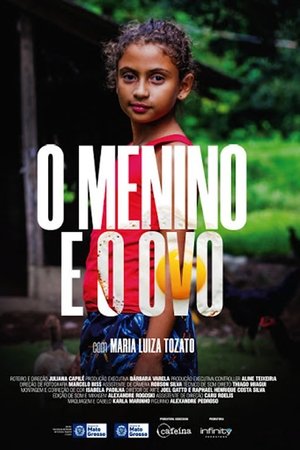Videos Playlist
Similar Collection
Images
-
Juli Capilé
You know what it's like at school – there's always some kid telling tall tales or rehashing urban legends. This boy (it's almost always a boy) personalises the story and tells it like it happened to him, or someone close to him, or his cousin's friend's uncle, so it must be true. Any adult overhearing this nonsense immediately recognises the tale and wryly smiles to themselves while yet another generation succumbs to the telling of the eternal story. You know which tales they are – giant sewer alligators that have grown big after being flushed down the toilet; a girl who got a large red spot on her face one night which grew and grew until a nest of baby spiders erupted from it; the teenagers who spoke the name 'Candyman' five times into the mirror until he appeared and slaughtered them all mercilessly – you know the ones. In The Boy And The Egg, the urban legend that Joana (Tozato) hears in the school canteen one day is altogether more sedate, but for her none the less potent. It's been a scorcher of a summer in Cuiaba, capital of the state of Mato Grosso in Brazil, and it seems, so the story goes, that it's hot enough to crack an egg onto the asphalt and it will fry itself right there and then. Joana is so taken with the idea that she loses concentration in class from thinking about it and then embarrasses herself in front of everyone by asking her teacher if it's true. Not to be discouraged, Joana begins sneaking eggs out from under her mother's nose to try out her own experiments. Unfortunately she is foiled at every turn and can't seem to find the right conditions to fry each successive egg she tries. In the end, while on a weekend trip to see her Aunt in the city, she has one last egg and one last attempt to see if she can conduct this amazing feat. In The Boy And The Egg, writer/director Juliana Capile has created an intriguing short story where her main character goes on a journey to find out what's important. Through the ups and downs (mostly downs) of trying to prove the story true, Joana loses sight of a lot of other things in her life. She has been taken over by a singular idea and we watch as this narrows her view of the world. In the end it's only when Joana may or may not be able to give up on this all consuming notion that she has a chance of being redeemed and able to move forward with everything else that is good in her life. Throughout the rest of the twelve minute runtime there are plenty of shots of family, love and affection, care and attention, mealtimes, outdoor spaces and reasons to be cheerful – all things that will pass Joana by if she's not careful. Capile does a good job of placing the camera and setting up her shots while cinematographer Marcelo Bliss allows the colour to pop from the screen in the outdoor scenes, contrasting this with the muted palette of the school. Maria Luiza Tozato does a great job of expressing Joana's emotions and is an excellent guide through this simple but effective story. While there may not be much going on outside the confines of this short narrative, the denouement does point to a wider world existing beyond Joana's door. Capile is probably right not to dwell on or politicise her final point and in the end what we get is rightfully Joana's own story, which in itself is honest and true. #WiliamHemingway https://www.ukfilmreview.co.uk/post/the-boy-and-the-egg-short-film-review

